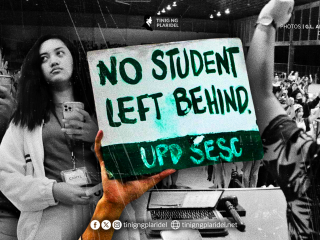By Jeuel Barroso
Space development is essential to the Philippines for its progress and the growth of its societal sectors, said National SPACE Development Program Leader Dr. Rogel Sese in a forum at the University of the Philippines Diliman National Institute of Physics Feb. 13.
Sese, an astrophysicist, said the national space agency, which is currently still a program, will contribute “unquantifiable benefits” to the Philippines including more efficient agriculture and fishing methods, better communication services, better disaster reactions, and national and regional economic growth.
“Most people will look at this development of space mainly for contemporary impacts such as the launch of a satellite or a new launch facility, but what is more important are the enduring impacts of space,” Sese said in his ‘Crafting the Philippine Space Agency’ talk, citing the smartphone’s GPS as an example of space technology.
Aside from being Sese’s personal dream, the National SPACE Development Program was founded to “establish the necessary frameworks and foundations necessary for the future National Space Agency.”
Upon establishment, the Philippine Space Agency will be the country’s sole agency responsible for addressing all space-related matters and issues.
Established in 2013 as a business institution called Regulus SpaceTech, the project is now funded by the Department of Science and Technology-Philippine Council for Industry, Energy and Emerging Technology Research and Development (DOST-PCIEERD).
According to the astrophysicist, the program can provide technology for the monitoring of crops and fisheries, as well as forests, seas, mountains and their pollution levels.
Communication applications of the program include global scale communications and satellite television.
In fact, the program’s Satellite Development Roadmap (SDR) is planned to provide free satellite data available for government agencies and the public.
Long-term research on Philippine climate as well as faster and more precise reactions to weather disasters can also be attained.
Incidentally, because of inadequate funding, President Rodrigo Duterte’s administration terminated Project NOAH (Nationwide Operational Assessment of Hazards) on Feb. 2. Project NOAH is a national disaster prevention and mitigation system crafted since 2012.
Moreover, the space agency will be the means to further develop the status of Philippine space development, which Sese claims is currently behind neighboring Asian countries.
“We are very dependent on foreign satellites… the Philippines only has one, which is the Diwata-1 microsatellite,” he said.
The astrophysicist further emphasized that the country lacks space scientists and engineers, has no ability to launch rockets to outer space, and is only signatory to one out of five international space treaties.
Meanwhile, Dr. Sese recognized the high cost of sustaining the space agency — a government-provided budget of at least P 24.4 billion as well as 800 trained space scientists and engineers for the next 10 years.
Nevertheless, the program seemed to have it easy through the legal process as two senate bills and four house bills were passed from September to December 2016 to legalize the agency.
The four were approved Jan. 31 by the House Committee on Government Reorganization and Science and Technology on its first reading.
“Frankly speaking we are told by people from the Congress and Senate that the rate that the space program is being pushed is very fast,” Sese said.
Likewise, a similar proposal to President Duterte on Jan. 9 was approved with an executive order currently awaiting signature.
“We need it for national development… having a space program is costly, but not having a space program is even costlier for the country,” Sese concluded. #









